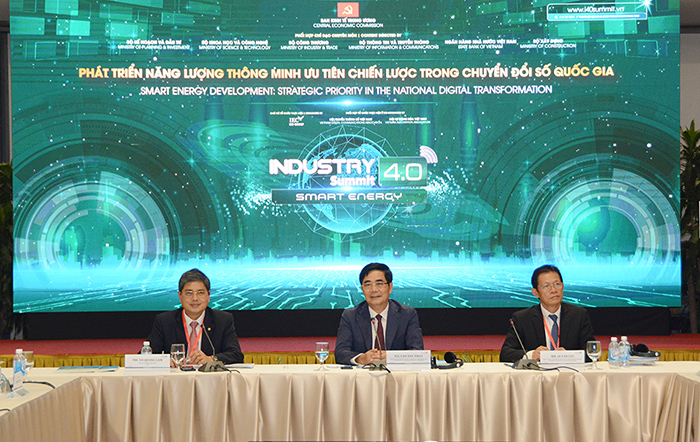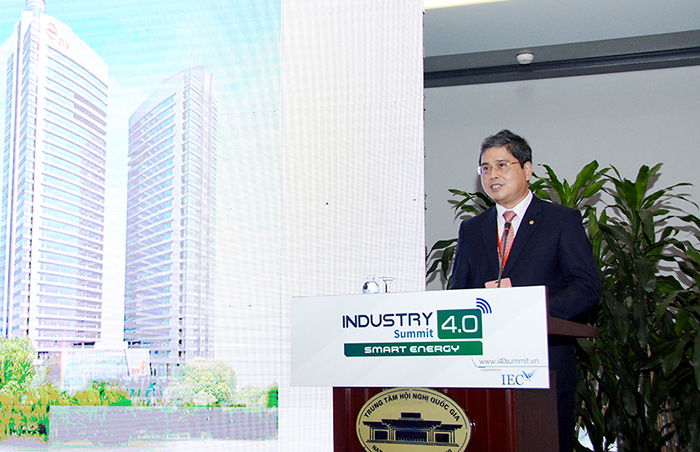Smart energy trend
At the opening remark of the Seminar, Mr. Cao Duc Phat - Member of the Party Central Committee, Deputy Head of the Central Economic Commission said that the Industrial Revolution 4.0 is opening up many opportunities for countries, especially developing countries like Vietnam.
A good national digital transformation, including digital transformation in the energy sector, is an important foundation for developing smart energy in a sustainable and efficient manner.

Mr. Cao Duc Phat - Member of the Party Central Committee, Deputy Head of the Central Economic Commission (in the middle) chaired the Seminar
According to Mr. Le Van Luc - Deputy Director of the Electricity and Renewable Energy Agency, together with the global development trend of Industry 4.0, Vietnam's energy industry has constantly been developing, updating and applying new technologies, having a high degree of automation in operation, data acquisition, monitoring, warning, remote control, economical and efficient use of energy, etc.
As Vietnam integrates renewable energy sources into the power system with an increasing proportion, the application of information technology and automation becomes a prerequisite for ensuring stable and reliable electricity supply as well as operating the power system in a safe and economical way.
Strong application of digital technology in energy management
Mr. Vo Quang Lam – EVN’s Vice President said that in Southeast Asia today, Vietnam's power system ranks first in terms of transmission lines, second in terms of generation capacity size and power sales, third in terms of power loss and fourth in terms of getting electricity indicator.
In particular, as of the end of June 2019, the total installed capacity of the national power system was 53,326MW, of which the capacity of renewable energy power plants (wind, solar, biomass) were 5,038MW, accounting for 9.5%.

EVN‘s Vice President Vo Quang Lam spoke at the Seminar
In order to effectively operate the largest scale power system in Southeast Asia, EVN has implemented synchronous solutions in an early manner, especially studying and strongly, thoroughly, efficiently adopting digital technologies , information technologies and automation (including but not limited to IoT, AI, Big data, Blockchain, etc.) into EVN's business and production activities.
41 component projects and studies under the Group's Industry 4.0 Project have been being implemented. EVN has formulated the most feasible implementation plans, selected digital transformation works and areas that can bring immediate effects to focus on deploying first.
At the Seminar, the Vice President of EVN facilitated the roundtable discussion with the participation of representatives from ministries, agencies, domestic and foreign businesses in the energy sector. The subjects of discussion include: mechanisms and policies for renewable energy development, major trends in technology transformation in the energy sector, the role of digital energy in the digital economy, application of Industry 4.0 in managing and using energy efficiently, etc.
EVN’s realizations in studying and application of the Industrial Revolution 4.0:
Power generation:
- New hydropower plants: Application of technologies to monitor equipment operation condition based on the actual condition of equipment and RCM (Reliability – Centered Maintenance).
- Thermal power plants: Advanced control and instrumentation equipment for operation, maintenance, repair, etc.
Power transmission:
- Objectives by 2020: Shifting 60% of 220kV substations and 100% of 110kV substations into unmanned substations.
- Application of GIS technology to computerize technical management and operation management.
- Successful application of unmanned aerial vehicles in transmission grid operation and management.
Load dispatching:
- Deploying SCADA/EMS system, IT system for electricity market.
- Using AGC (Automatic Generation Control) system, the application automatically controlling power plants, to remotely control solar power plants.
Power distribution, business - customer service:
- Simultaneously deploying e-invoices in 63 provinces and cities since 2013.
- Providing online electricity services equivalent to level 4 public services from 2018.
- 2019: Deploying the delivery of electricity services in the mode of electronic transactions.
- AI application (chatbot) in customer care.
Corporate governance:
- Application of Enterprise Resource Planning (ERP) system.
- 100% of officials and employees use electronic filing system through HRMS software.
- 100% of units use E-Office system in their works.
evn.com.vn
Share